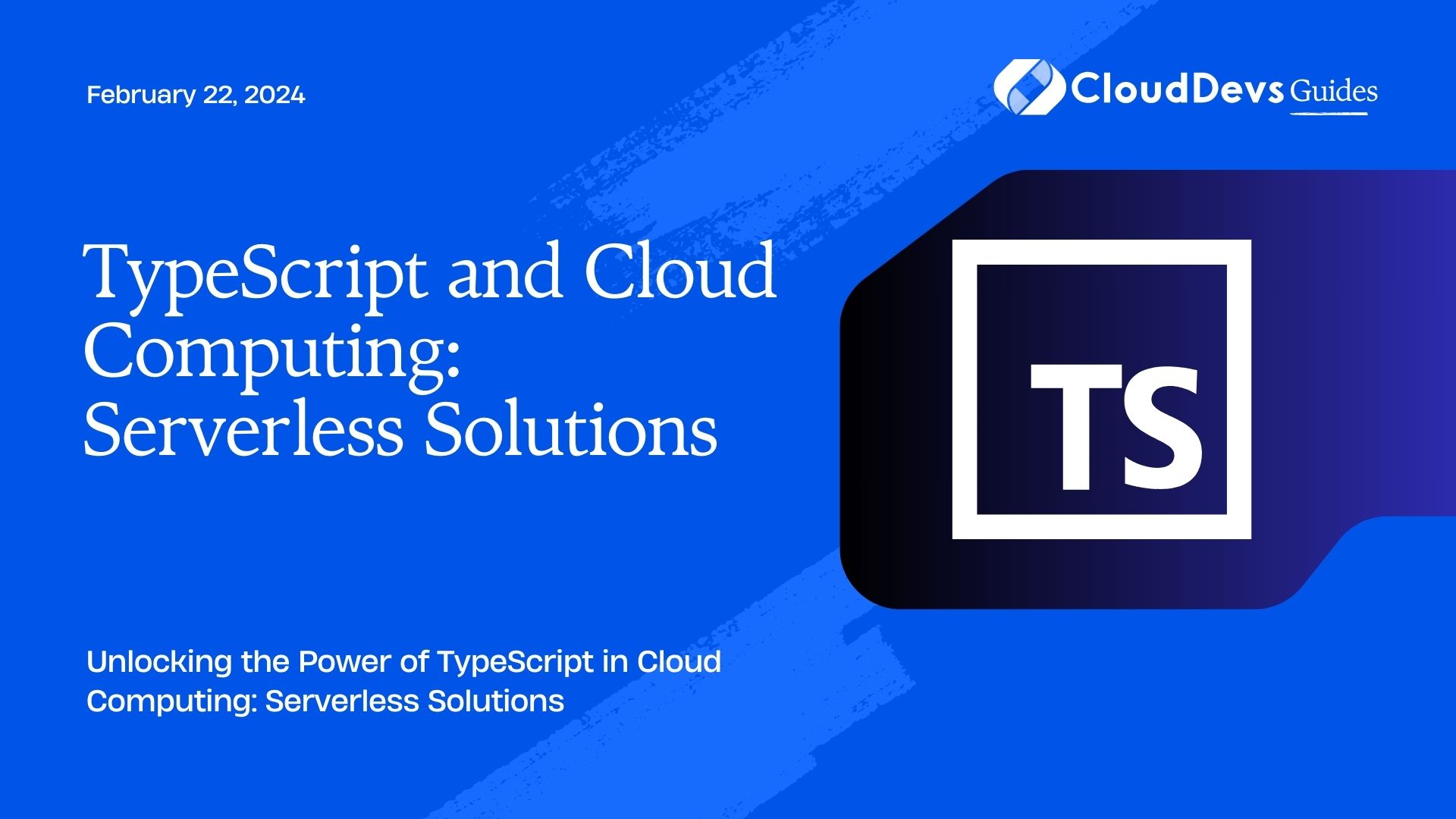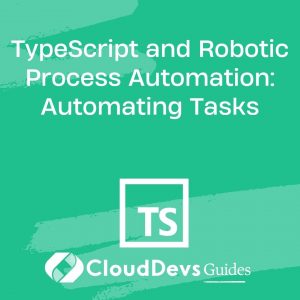TypeScript and Cloud Computing: Serverless Solutions
In the ever-evolving landscape of cloud computing, serverless solutions have emerged as a game-changer. These solutions allow developers to focus on writing code without worrying about infrastructure management. However, to harness the full potential of serverless computing, developers need powerful tools that provide type safety, code readability, and maintainability. Enter TypeScript, a statically typed superset of JavaScript. In this blog post, we will explore how TypeScript complements serverless solutions in cloud computing, its benefits, use cases, and provide you with code samples to get started.
Table of Contents
1. Understanding Serverless Computing
1.1. What is Serverless Computing?
Before we dive into TypeScript’s role in serverless computing, let’s briefly understand what serverless computing is. Serverless computing is a cloud computing model where the cloud provider manages the infrastructure, and developers focus solely on writing code to run in the cloud. In this model, developers do not need to worry about server provisioning, scaling, or maintenance, as the cloud provider handles these aspects.
1.2. Benefits of Serverless Computing
Serverless computing offers several advantages, including:
- Cost-Efficiency: Developers pay only for the resources their code consumes, leading to cost savings.
- Scalability: Serverless platforms automatically scale to accommodate varying workloads, ensuring optimal performance.
- Reduced Operational Overhead: Developers can focus on code development rather than managing infrastructure, reducing operational overhead.
- Rapid Development: Serverless platforms facilitate rapid development and deployment of applications.
2. The Power of TypeScript in Serverless Computing
2.1. Why TypeScript?
TypeScript is a statically typed superset of JavaScript that brings enhanced type safety, code readability, and maintainability to your projects. These features make TypeScript an excellent choice for serverless computing. Let’s explore how TypeScript enhances serverless solutions:
2.1.1. Type Safety
One of the key advantages of TypeScript is its strong type system. This feature helps catch type-related errors at compile-time, reducing the likelihood of runtime errors. In serverless computing, where reliability is crucial, TypeScript’s type safety is a significant asset.
typescript
// TypeScript code example
function add(x: number, y: number): number {
return x + y;
}
const result = add(3, '5'); // Type error: Argument of type '"5"' is not assignable to parameter of type 'number'.
In the code sample above, TypeScript detects the type mismatch between the arguments and raises an error during compilation, preventing a potential runtime issue.
2.1.2. Code Readability and Maintainability
TypeScript’s static typing and type annotations make the code more self-documenting. This improves code readability and helps developers understand the codebase quickly. Additionally, when working on large serverless projects, TypeScript’s strong type system aids in maintaining code integrity.
typescript
// TypeScript code example
interface User {
id: number;
name: string;
email: string;
}
function getUserInfo(user: User): string {
return `User: ${user.name} (${user.email})`;
}
In this code snippet, the User interface defines the structure of a user object, making it clear what properties are expected. This enhances code comprehension and maintenance.
2.1.3. IDE Support
TypeScript enjoys robust support in integrated development environments (IDEs) like Visual Studio Code. IDEs provide features like autocompletion, code navigation, and real-time error checking, which streamline serverless development.
2.1.4. Seamless Integration with JavaScript
TypeScript is a superset of JavaScript, meaning that you can use existing JavaScript code in your TypeScript projects. This is particularly valuable in serverless computing, where you may need to incorporate existing libraries or scripts.
3. Use Cases for TypeScript in Serverless Computing
Now that we’ve explored TypeScript’s advantages, let’s delve into specific use cases where TypeScript shines in serverless computing.
3.1. AWS Lambda
AWS Lambda is a popular serverless compute service that allows you to run code without provisioning or managing servers. TypeScript is an excellent choice for writing Lambda functions due to its type safety and ease of use.
Here’s a simple TypeScript example of an AWS Lambda function that responds to an HTTP request using the AWS Serverless Application Model (SAM):
typescript
import { APIGatewayProxyHandler } from 'aws-lambda';
export const handler: APIGatewayProxyHandler = async (event) => {
const response = {
statusCode: 200,
body: JSON.stringify({ message: 'Hello, TypeScript in AWS Lambda!' }),
};
return response;
};
3.2. Azure Functions
Azure Functions is Microsoft’s serverless computing offering. TypeScript can be used to write Azure Functions, allowing developers to leverage its benefits.
Here’s a TypeScript example of an Azure Function that processes an Azure Queue Storage message:
typescript
import { AzureFunction, Context } from '@azure/functions';
const queueTrigger: AzureFunction = async function (context: Context, myQueueItem: any): Promise<void> {
context.log(`Processing queue item: ${myQueueItem}`);
// Your processing logic here
};
export default queueTrigger;
3.3. Google Cloud Functions
Google Cloud Functions is Google’s serverless compute service. TypeScript is supported for writing Google Cloud Functions, enhancing code quality and developer productivity.
typescript
import { Request, Response } from 'express';
export const helloWorld = (req: Request, res: Response) => {
const message = 'Hello, TypeScript in Google Cloud Functions!';
res.status(200).send(message);
};
3.4. Custom Serverless Solutions
In addition to major cloud providers’ offerings, you can build custom serverless solutions using platforms like AWS CDK or Serverless Framework. TypeScript plays a crucial role in these custom solutions, ensuring robustness and maintainability.
4. Getting Started with TypeScript and Serverless Computing
To get started with TypeScript in serverless computing, follow these steps:
- Install Node.js and TypeScript: Ensure you have Node.js and TypeScript installed on your development machine.
- Create a New Serverless Project: Choose a serverless platform (e.g., AWS Lambda, Azure Functions) and create a new project.
- Initialize TypeScript: Initialize TypeScript in your project using tsc –init and configure your tsconfig.json file.
- Write Your Functions: Write your serverless functions in TypeScript, taking advantage of TypeScript’s features.
- Deploy Your Functions: Deploy your functions to your chosen serverless platform.
Conclusion
TypeScript and serverless computing are a powerful combination for modern cloud-based applications. TypeScript’s type safety, code readability, and maintainability make it an ideal choice for developing serverless functions. Whether you are using AWS Lambda, Azure Functions, Google Cloud Functions, or building custom solutions, TypeScript can help you build robust and scalable serverless applications. So, if you haven’t already, consider incorporating TypeScript into your serverless development workflow and unlock the full potential of cloud computing.
In this blog post, we’ve explored the benefits of TypeScript in serverless computing, provided code samples, and highlighted its use cases across various cloud platforms. With TypeScript, you can write serverless functions with confidence, knowing that your code is both readable and reliable, ultimately leading to a more efficient and enjoyable development experience.
Start your journey into the world of TypeScript and serverless computing today and witness the transformation it brings to your cloud-based applications.
Table of Contents









